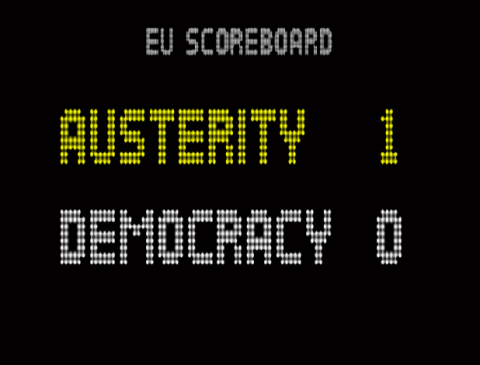No to austerity, Yes to democracy

In the midst of all the bluster about billions and bailouts, the most fundamental consequence of adopting the Fiscal Treaty into law has largely being ignored; namely the threat the treaty poses to the very nature of European democracy.
The Fiscal Treaty’s institutionalisation of austerity will mean that all future governments will be forced to pursue current austerity policies regardless of how many people oppose them. This means that one of the most basic requirements of any democracy – that citizens are free to decide budgetary and economic policies and strategies – will be lost, and people in Ireland and across Europe will be forced to endure year after year of grinding austerity.
The late Peter Gowan coined the marvellous phrase ‘the Hayekian Europe’ to describe the political nature of the European Union. Friedrich Hayek, the principle theoretician of neoliberalism, argued that national states, national parliaments and the social compromises which have been the outcome of the social and political dynamics of contemporary politics, were insuperable obstacles to the implementation of the neoliberal project and needed to be eroded and destroyed.
The Fiscal Treaty is an attempt to do precisely that. It represents the latest in a series of measures to institutionalise democratic collapse, to institutionalise the state of emergency that - as Naomi Klein has shown - always goes hand in hand with shock therapy. This is what is at stake.
The crisis has provided the European elites with a welcome opportunity to circumvent democratic structures, to present democracy as a luxury we can no longer afford. Already we have seen more and more of the key decisions about our economy and our public services being put into the hands of powerful bureaucrats and unaccountable institutions, in particular the European Central Bank (ECB). The ECB is an institution that wields immense power, yet no one knows how the unelected members of its governing council vote, because no minutes of meetings are ever published.
The unelected European Commission played a central role in the removal of elected governments in Italy and Greece and their replacement by bankers’ governments. Indeed, Italian president Giorgio Napolitano, defending the appointment of Italy’s non-elected prime minister, Mario Monti, stated that the country “could not afford elections at a time of market crisis”.
A cabal of technocrats who every day make decisions that result in the immiseration of millions of people across Europe now runs Europe. They include: the head of the IMF and former French Finance Minister, Christian Lagarde; the President of the European Central Bank (ECB) and former vice-President of Goldman Sachs, Mario Draghi; the President of the European Commission, José Manuel Barroso; the chairman of the Eurogroup, Jean-Claude Juncker; president of the European Council, Herman van Rompuy; and Olli Rehn, Europe's economic and monetary affairs commissioner.
These are the individuals that increasing make all of the key decisions in Europe. They decide if and when Greece or Italy can hold elections. They decide when Ireland, Greece or Portugal get the next tranche of bailout cash and, crucially, at what cost. The only thing that matters to these individuals is what the markets think.
If we want to see the future they envision, we only have to look to Greece, which has become a laboratory for social change that, if these individuals have their way, will spread across Europe. Greece is quickly becoming a society without social and public services, where, as Alain Badiou remarked, “vulnerable populations are doomed to a programmed elimination”.
Voting No will not immediately change the direction of Europe, but it will be an important step in building a movement against austerity. The recent elections in France and Greece are indicative of the emergence of a popular consciousness against austerity that is emerging across Europe. In France the radical left got just over 12.5% of the vote in the presidential election. Social democrat and new French President François Hollande has been forced to tack left and campaign on an anti-austerity platform. More significant, however are the election results in Greece. Greek voters have overwhelmingly voted against austerity. Parties that supported the ‘bailout’- both the conservative New Democracy and the social democratic PASOK - were destroyed. The radical left alliance SYRIZA has now become the second largest party in the Greek parliament.
Ireland is the only country in Europe that has a vote on Fiscal Treaty. When we vote tomorrow, we vote not just for ourselves, but for the whole of Europe. We should make our vote count and vote No. {jathumbnailoff}
